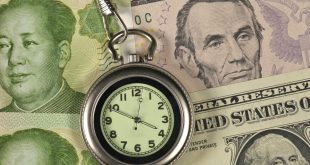Wall Street’s main indexes were flat to lower in choppy trading on Monday as investors paused after the previous week’s rally and exercised caution ahead of numerous job reports and comments through the week from Federal Reserve policymakers, including Chair Jerome Powell.
Monday’s US market indices were neutral as traders awaited Jerome Powell, the chair of the Federal Reserve, remarks and economic data. Powell will address the state of the economy later in the day at an event hosted by the National Association for Business Economics. A number of economic reports, such as the September jobs report and the S&P manufacturing and services PMIs, are scheduled to be released this coming week. When the market opened at 9:47 a.m., the Dow Jones Industrial Average dropped 226.69 points, or 0.54%, to 42,086.31, the S&P 500 dropped 4.52 points, or 0.08%, to 5,733.65, and the Nasdaq Composite increased by 44.41 points, or 0.25%, to 18,164.00.
The Dow Jones Industrial Average dropped 77.94 points, or 0.18 percent, to 42,235.06 at the opening bell. The Nasdaq Composite dropped 44.76 points, or 0.25 percent, to 18,074.83, while the S&P 500 dropped 11.43 points, or 0.20 percent, to 5,726.74. Automakers Ford Motor and General Motors had their shares decline by 2.2% and 3%, respectively, following the reduction of their yearly projections by European counterpart Stellantis NV.
The US-listed Alibaba stock increased by 3.5 percent, Li Auto’s stock increased by 6%, and PDD’s stock increased by 3.3% following the announcement on Sunday by China’s central bank that it would instruct lenders to reduce the interest rates on current house loans. Carnival, a cruise ship operator, saw a 4.1% fall in revenue and profit for the second quarter despite reporting higher revenue and earnings for the most recent quarter than analysts had predicted. It provided a growth estimate for a significant underlying profit measure for the current quarter that was below analysts’ projections.
The yield on the 10-year Treasury remained stable at 3.75 percent in the bond market. The yield on the 2-year Treasury note increased from 3.56% to 3.59%. After an exciting start to the week for Asian financial markets, where Chinese indices surged and Japanese stocks plummeted, US stocks are trading close to record levels on Monday. In early trade, the S&P 500 saw a 0.2% decline after recording its sixth consecutive week of gains. From its record high established on Friday, the Dow Jones Industrial Average lost 107 points, or 0.3%, of its value. As of 10:15 a.m. Eastern time, the Nasdaq composite was down 0.2%.
Wall Street is taking a break after shooting to all-time highs on the expectation that the faltering US economy may continue to expand while the Fed continues to slash interest rates to give it more leverage. When the US government releases its most recent monthly report on the labor market on Friday, it will be a major test. The main concern on Wall Street is whether a recession is already imminent for the economy. Employers in the United States have already started to reduce hiring even though the Federal Reserve cut rates earlier this month and has hinted that more will follow. The Federal Reserve had maintained interest rates at a two-decade high prior to this month in an attempt to curb excessive inflation by slowing the economy.
Payrolls remain the biggest catalyst for the U.S. stock market until the election. Some economists are expecting Friday’s report to show hiring in September was stronger than the 146,000 growth in payrolls that economists across Wall Street are broadly forecasting. In the past, a stronger-than-expected number could have hurt the stock market by fanning worries about upward pressure on inflation. Now, though, it would likely be welcomed as a signal that a recession shouldn’t be as big a worry.
Interest rates and the strength of the economy are usually the two main levers that set prices for stocks. In Asia, the levers were pulling in opposite directions. Japan’s Nikkei 225 slumped 4.8% on worries that the country’s incoming prime minister will support higher interest rates and other policies that investors see as less market-friendly. Shigeru Ishiba is set to take over on Tuesday. Ishiba has expressed support for the Bank of Japan’s move to pull interest rates away from their near-zero level, which puts upward pressure on the value of the Japanese yen. A stronger yen can hurt profits for Japanese exporters, who make sales in other currencies and then convert them back into yen.
On Monday, Honda Motor’s shares sank 7% while Toyota Motor’s lost 7.6% in Tokyo. The business Stellantis, which owns the Jeep brand among others, saw a 14% decline in Milan after lowering its earnings projection for the near future. It mentioned more Chinese competition and spending to turn around its US operations. Consequently, this contributed to the downfall of Wall Street automakers Ford Motor and General Motors. GM sank 2.4% and Ford fell 2.1%.
Meanwhile, in China, indexes shot up 2.4% in Hong Kong and 8.1% in Shanghai as a result of the most recent stimulus initiatives for the second-largest economy in the world. For Shanghai stocks, it was the best day in almost sixteen years. On Sunday, the People’s Bank of China declared that by October 31st, mortgage rates for current house loans would be lowered. This came after a flurry of statements last week from China’s government and central bank aimed at supporting the country’s economy, whose expansion has been faltering due in part to the weight of a faltering real estate sector. On Tuesday until October 7, mainland China’s markets will be closed in observance of a holiday commemorating 75 years of communist leadership.
In the bond market, the yield on the U.S. 10-year Treasury was holding steady at 3.75%, where it was late Friday. The two-year yield, which more closely tracks expectations for what the Fed will do with short-term rates, rose. It climbed to 3.59% from 3.56%.
 Noor Trends News, Technical Analysis, Educational Tools and Recommendations
Noor Trends News, Technical Analysis, Educational Tools and Recommendations





